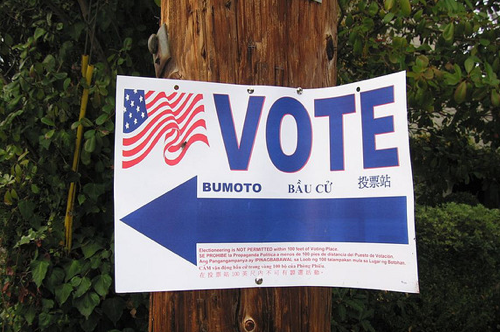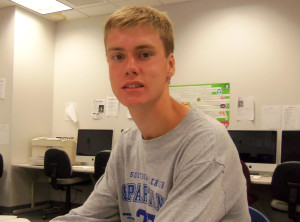Promote Voting Through Education

Public elections are fundamental to the preservation of American democracy. The 2012 election saw approximately 126 million voters taking part in one of their most important civic duties. About one fifth of the voting-eligible population in the United States is considered the “youth vote,” which contains citizens ages 18 to 29. However, only about 45 percent of eligible young voters cast their ballots in the 2012 presidential election. In order to preserve American democracy, this rate must rise.
“In today’s culture, interest in politics or government is viewed as ‘uncool,’” junior Matthew Watkins, a member of the recently formed Young Americans for Freedom (YAF) political club, said. “Often times, young people choose their political affiliations based on what they see in the media and also by flowing with the popular trend, and this leads to uneducated voters.”
I believe that voter education and self-awareness of one’s beliefs should be promoted in schools so that the number of young voters within the 18-29 year-old range can increase.
According to CIRCLE, The Center For Information & Research on Civic Learning and Engagement, young people need to vote as soon as they are old enough because “voting is habit-forming.” If young voters begin to take part in elections when they are 18, they are more likely to continue voting later on in life.
“This generation does not learn about the way the government works or about their own ideology,” Watkins said, “so in a few years we will simply have a generation of voters who are uneducated and choose political candidates for all the wrong reasons.”
The answer is the promotion of ideological and candidate awareness. Educational institutions should offer a way for students to come face-to-face with the issues and allow them to become informed about the candidates so they can find the ones that most match their views.
This way, young voters can make informed decisions about who they feel would best represent their interests in the government. Political clubs are a great place to start.
“The first objective of any young person regarding politics should be figuring out what their views are,” junior Brycen Holland, president of YAF, said. “Political clubs in high schools and colleges help young people decide what they believe; these clubs also help provide information that can further their political knowledge, creating more educated voters for the future.”
This is not to say by any means that a school should teach its students to ideologically lean a certain way. Rather, teachers should provide both sides of every issue so that students understand a variety of the aspects of politics and can make informed decisions based on their beliefs.
“If schools provided unbiased accounts of what both sides of the political spectrum valued, perhaps students could more closely align themselves with what they truly believe,” Watkins said.
Simply providing educational pamphlets or papers is not enough. Around election day, information should be given out to students and there should be an amount of time devoted to giving them the chance to educate themselves. If students have time set aside for educating themselves about the issues and candidates, they will be able to wisely exercise an essential freedom.
“Nobody will ever deprive the American people of the right to vote except the American people themselves,” Mr. Franklin Delano Roosevelt, 32nd President of the United States, once said. “The only way they could do that is by not voting at all.”

Junior Alex Miller is a first-year reporter for the Spotlight. At the recommendation of a teacher, Alex decided to try journalism because it was something...

